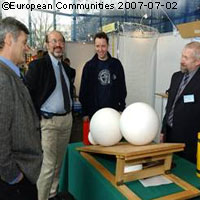More meaningful dialogue between researchers and society needed, says EURAB
Researchers need to engage in more meaningful exchanges with society and take public concerns about their work more seriously, according to a report from the European Research Advisory Board (EURAB). In recent years, researchers have stepped up efforts in communicating their research to the wider public. Activities have included science weeks and festivals and conferences involving non-governmental organisations. However, such communication initiatives have often had limited success, and in some cases, even exacerbated public risk perception of research-based developments. One explanation for failing to make a connection is that the public often does not have the same priorities and value systems as researchers. 'Human nature is stubbornly subjective and often resistant to rational ordering. Societal actors can take different perspectives and follow different paths to knowledge than researchers,' states the report. 'So merely communicating better what science is doing might not be sufficient and could even be antagonising.' The report suggests that 'researchers should try to view their work from the societal dimension, engage other stakeholders and take public concerns about their work seriously'. Adapting research to societal needs and interests is not just about dispelling public concerns, it is also important to Europe's future economic growth. 'If researchers are not attuned to the public's concerns, expressed for example through stakeholders and societal actors, their results might not be sufficiently socially relevant, putting at risk any potential innovations that could be developed,' states the report. EURAB makes several recommendations on how the research community could improve dialogue and engagement with different societal actors. One suggestion is to introduce non-scientific perspectives into university curricula. Because they work mainly in closed circles, researchers are rarely exposed to other perspectives or societal actors. Universities should therefore try to develop structures to 'square these circles', says EURAB, to encourage dialogue and plant seeds for more open interaction. 'It is during these formative years that researchers could be able to understand how the public perceives their work, not as clear black and white answers, but as shades of grey shaped by other concerns.' Another means to increase dialogue is through making it a factor that influences a researcher's career perspectives. In a 'research driven' culture, researchers are under enormous pressure to publish their research, to attract funding to their departments and build careers on 'hard research'. Communicating science is seen to have a negative effect on their careers. For EURAB, this shift in perception will be a long-term process, in which European Commission could be instrumental. It could, for example, produce a series of actions highlighting the value of greater engagement and how this could advance research careers. But is not just researchers who need to change, society also has to become more involved in the research process. 'Empowering societal actors is the first step to having them motivated to dialogue on research and innovation,' says EUIRAB. Keeping them involved in the process entails providing the means for societal actors to identify themselves as contributing positively to the dialogue in some way - as partners. 'In other words, societal actors like patients groups should be given the opportunity to develop their own research capacities,' states the report. It finds that the 'Capacities' programme of the Seventh Framework Programme (FP7) is going in the right direction, proposing actions to bring societal actors and researchers closer together. EURAB says that it will closely monitor the progress of these actions. The European Technology Platforms (ETPs) could also provide an effective means to increase the involvement of society in research. To date, ETP multi-stakeholder engagement has largely been limited to business, government and academia. To engage a wider audience, EURAB suggests the establishment of consensus workshops. 'The information generated from participatory processes, fed into the Technology Platforms, is not only useful for identifying stakeholder 'red-light / green-light' consensus positions to guide research directions, but it could eventually encourage a more balanced interaction of societal actors onto the platforms,' notes the report. Getting different societal actors more involved in the various stages of the research evaluation is offered up as the final recommendation in the report. This would entail first benchmarking the present involvement of societal actors in the assessment processes, and evaluating the trends in their participation level. 'Societal actors could make valuable contributions to impact assessment teams. Having societal actors in the position of judge and jury could also motivate the researchers to increase their dialogue and integrate other views during their research,' concludes EURAB.



